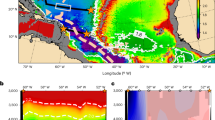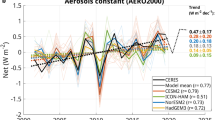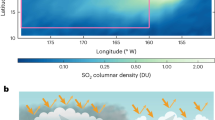Abstract
One of the major riddles of terrestrial evolution concerns the history of the Earth's surface temperature. Present models of solar evolution indicate that the luminosity was about 25% smaller at the time of formation of the Solar System1. This factor alone would have caused the Earth's surface temperature to be below freezing, yet the geological record indicates that water has flowed on the surface since at least 3,800 Myr ago2. Enhanced levels of CO2 in the atmosphere could have provided the necessary warming to maintain the temperature above freezing. Increased tectonic activity, and a decrease in solubility of CO2 in the oceans, rock weathering, and sediment deposition are processes that have been suggested for these larger amounts of CO2. We show here that large CO2 concentrations are necessary to maintain the early Earth's surface temperature at approximately today's level. If there were a thousand tunes the present atmospheric level (PAL) of CO2 in the atmosphere, the temperature would be 292K, while a 100-fold increase in CO2 concentration yields 284K. The surface warming is highly dependent on the amount of water vapour and clouds, both of which we have little knowledge of for this very early time in the Earth's history.
This is a preview of subscription content, access via your institution
Access options
Subscribe to this journal
Receive 51 print issues and online access
$199.00 per year
only $3.90 per issue
Buy this article
- Purchase on Springer Link
- Instant access to full article PDF
Prices may be subject to local taxes which are calculated during checkout
Similar content being viewed by others
References
Newman, M. J. & Rood, R. T. Science 198, 1035–1037 (1977).
Lowe, D. R. A. Rev. Earth planet. Sci. 8, 145–167 (1980).
Sagan, C. & Mullen, G. Science 177, 52–56 (1972).
Kuhn, W. R. & Atreya, S. K. Icarus 37, 207–213 (1979).
Kasting, J. F. J. geophys. Res. 87, 3091–3098 (1982).
Holland, H. D. Petrologic Studies: A Volume to Honor A. E. Buddington 447–477 (Geological Society of America, New York, 1962).
Walker, J. C. G. Evolution of the Atmosphere (Macmillan, New York, 1977).
Owen, T., Cess, R. D. & Ramanathan, V. Nature 277, 640–642 (1979).
Hart, M. H. Icarus 33, 23–39 (1978).
Holland, H. D. The Chemistry of the Atmosphere and Oceans (Interscience, New York, 1978).
Li, Y., Am. J. Sci. 272, 119–137 (1972).
Walker, J. C. G., Hays, P. B. & Kasting, J. F. J. geophys. Res. 86, 9776–9782 (1981).
Hargraves, R. B. Science 193, 363–371 (1976).
Hummel, J. & Kuhn, W. R. Tellus 33, 372–381 (1981).
Hansen, et al, Science 213, 957–966 (1981).
Arculus, R. J. & Delano, J. W. Nature 288, 72–74 (1980).
Author information
Authors and Affiliations
Rights and permissions
About this article
Cite this article
Kuhn, W., Kasting, J. Effects of increased CO2 concentrations on surface temperature of the early Earth. Nature 301, 53–55 (1983). https://doi.org/10.1038/301053a0
Received:
Accepted:
Issue Date:
DOI: https://doi.org/10.1038/301053a0
This article is cited by
-
Habitability of the early Earth: liquid water under a faint young Sun facilitated by strong tidal heating due to a closer Moon
PalZ (2021)
-
Effects of primitive photosynthesis on Earth’s early climate system
Nature Geoscience (2018)
-
Nitrogen Fixation By Corona Discharge On The Early Precambrian Earth
Origins of Life and Evolution of Biospheres (2005)
-
Prebiotic ammonia from reduction of nitrite by iron (II) on the early Earth
Nature (1993)
Comments
By submitting a comment you agree to abide by our Terms and Community Guidelines. If you find something abusive or that does not comply with our terms or guidelines please flag it as inappropriate.



